Benjamin Franklin’s Favorite Sister
Benjamin Franklin, the tenth of Josiah Franklin’s sons, was six years old when Jane, the seventh daughter, was born on March 27, 1712. Known to historians as Benjamin Franklin’s favorite sister, Jane was eleven when her restless brother ran away from Boston to begin his career in Philadelphia. After that, the two were together only seven times in their long lives, sometimes briefly, never more than a few months at a time.
On July 27, 1727, Jane was married at fifteen to Edward Mecom, a neighbor eight years her senior. It appears that her parents didn’t ¬like the match, possibly because of her youth, because she was married not by one of the ministers of her family church, but by William Cooper of the Brattle Street Church, which her uncle had attended.
Edward came from a family even more obscure than the Franklins were at that time, and he made no mark except as Jane’s husband. They had twelve children – eight sons and four daughters, of which only one daughter, Jane, survived her. All of them except one were named after Jane’s parents or brothers or sisters or herself, though her husband also had a sister. During Edward’s later years, he was an invalid.
Jane’s life with Edward Mecom was fraught with economic and emotional difficulty. She bore twelve children over a period of twenty-one years; she outlived her husband and eleven of her children. Three babes died before their first birthday. Two sons suffered from disabling mental illness in adulthood. Grandchildren gave her headaches and heartache. Her life was not easy, and was not atypical of 18th century colonial women.
Dedicated Letter Writers
Distance and very different destinies did not weaken the sibling bond, however. Jane and her brother were dedicated letter writers. Months, or even years, might pass between letters, but the correspondence that began in 1727 continued until Benjamin Franklin’s death in 1790 – a total of 63 years.
It is believed that the first letter Ben Franklin wrote to his sister was to congratulate her upon her marriage:
Philadelphia, January 6, 1727
Dear Sister,
I am highly pleased with the account captain Freeman gives me of you. I always judged by your behavior when a child that you would make a good, agreeable woman, and you know you were ever my peculiar favorite.I have been thinking what would be a suitable present for me to make, and for you to receive, as I hear you are grown a celebrated beauty. I had almost determined on a tea table, but when I considered that the character of a good housewife was far preferable to that of being only a pretty gentlewoman, I concluded to send you a spinning wheel, which I hope you will accept as a small token of my sincere love and affection.
Sister, farewell, and remember that modesty, as it makes the most homely virgin amiable and charming, so the want of it infallibly renders the most perfect beauty disagreeable and odious. But when that brightest of female virtues shines among other perfections of body and mind in the same person, it makes the woman more lovely than an angel. Excuse this freedom, and use the same with me.
I am, dear Jenny, your loving brother,
B. FRANKLIN
The correspondence between her and her brother was a source of joy for Jane Mecom. It provided emotional support for both of them, and created a lifelong bond that weathered physical separation, the upheaval of the Revolutionary War, and the challenges of old age.
What emerges from their correspondence is a story of two people who feel great affection and respect for each other. Jane kept her brother informed of family news – the health of parents and siblings, the joys and sorrows of numerous nieces and nephews.
Jane’s son, Benjamin, was particularly important to Franklin, who set him up as a printer in Antigua 1752. Benjamin later quarreled with his uncle and bought the press from him, moving it from Antigua to Boston in 1757, and from there to several other colonial cities. Benjamin Mecom went insane, as did his brother Peter, and disappeared some time following the battle of Trenton.
When in July 1753, Benjamin Franklin visited in Boston, he found his sister Jane in awe of him as she had never been before. Benjamin, the apprentice of thirty years before who in the New England Courant had ridiculed the “beetle-skulls” of Harvard, now received from Harvard the earliest of his academic honors.
Jane read in the Boston Gazette of July 31, 1753:
On Monday last, the Corporation of Harvard College met at Cambridge, and taking into consideration the great genius of Benjamin Franklin of Philadelphia, Esq., for learning, the high advances he has made in natural philosophy, more especially in the doctrine and experiments of electricity, whereby he has rendered himself justly famous in the learned world, unanimously voted him a degree of Master of Arts, which vote was the day following as fully confirmed by the Overseers of that Society, and on Friday the President presented him a diploma there for.
London, March 1, 1766
Dear Sister,
I acknowledge the Receipt of your kind Letters of Nov. 12. and Dec. 20. the latter per Mr. Williams. I condole with you on the Death of your Husband, who was I believe a truly affectionate one to you, and fully sensible of your Merit. It is not true that I have bought any Estate here.I have indeed had some thoughts of re-purchasing the little one in Northamptonshire that was our Grandfather’s, and had been many Generations in the Family, but was sold by our Uncle Thomas’ only Child Mrs. Fisher, the same that left you the Legacy. However I shall not do it unless I determine to remain in England, which I have not yet done.
Your affectionate Brother
B Franklin
During the winter and spring before the Battle of Lexington in 1775, Jane Mecom wrote her brother, she afterward told him, “a great number of letters,” but there is nothing to show that they reached Ben in London. She believed they were intercepted, and they may have been.
During 1775, Ben Franklin was elected as a Pennsylvania Delegate to the Second Continental Congress, served as chairman of the Pennsylvania Committee of Safety, and was appointed Postmaster General of the Colonies.
In the year 1776, Ben served on a committee of five who drafted the Declaration of Independence. He arrived in Paris on December, 21, to serve as one of the Commissioners of Congress to the French Court.
During the Revolution, Jane Franklin Mecom moved to Warwick, Rhode Island, and stayed with Franklin’s friends, Catherine Ray Greene and her husband William. From there, she went to the Philadelphia home of Sarah (Ben’s daughter) and Richard Bache.
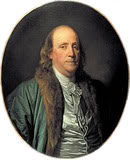
Image: Portrait of Benjamin Franklin
by Jean-Baptiste Greuze, 1777
Passy, near Paris, October 5, 1777
Dear Sister,
I suppose some of your kind Letters to me have miscarried, as I have received but one since my Arrival in France. I hope nevertheless that you continue well, and that you are still with my Children, especially as it is supposed that the Howes are gone to Boston, where you must have been again disturbed if you had returned thither.I enjoy here an exceeding good State of Health. I live in a fine airy House upon a Hill, which has a large Garden with fine Walks in it, about ½ an hour’s Drive from the City of Paris. I walk a little every Day in the Garden, have a good Appetite and sleep well.
I think the French Cookery agrees with me better than the English; I suppose because there is little or no Butter in their Sauces: for I have never once had the Heartburn since my being here tho’ I eat heartily, which shows that my Digestion is good.
I have got into a good Neighborhood, of very agreeable People who appear very fond of me; at least they are pleasingly civil: so that upon the whole I live as comfortably as a Man can well do so far from his Home and his Family.
I was glad to learn by yours (which was dated December 16. 76.) that your Son Calas was returned, and engaged in the Service of the Public. I hear he was in France lately, I suppose he brought your Letter as you mention sending it by him; but he did not come up to Paris, and so I did not see him. I wish him Success in his new Employment.
My Grandchildren here are a Comfort and Pleasure to me. I long to see little bold Will. Kiss him for me. In short I long to see and be with you all: But God only knows whether I shall ever be so happy again. I am, as ever, my dear Sister, Your affectionate Brother
B Franklin
The Pennsylvania Assembly unanimously chose Ben Franklin as their delegate to the Second Continental Congress. In June 1776, he was appointed a member of the Committee of Five that drafted the Declaration of Independence. Although he was temporarily disabled by gout and unable to attend most meetings of the Committee, Franklin made several small changes to the draft sent to him by Thomas Jefferson. At the signing, Ben is quoted as having replied to a comment by Hancock that they must all hang together: “Yes, we must, indeed, all hang together, or most assuredly we shall all hang separately.”
In December 1776, Franklin was dispatched to France as commissioner for the United States. He lived in a home in the Parisian suburb of Passy. Franklin remained in France until 1785, and was such a favorite of French society that it became fashionable for wealthy French families to decorate their parlors with a painting of him. While there, he secured a critical military alliance in 1778 and negotiated the Treaty of Paris in 1783.
During the winter of 1782-83, Jane Mecom had the first serious illness of her life, of which she spoke in a letter to Richard Bache the following April, two weeks after her seventieth birthday:
I have had such an admonition this winter of the suddenness by which I might be called out of this world, which was succeeded by a severe fit of sickness that has taught me to be continually looking to the decisive hour when I shall have no further concern in this world.
Jane corresponded with Franklin while he was abroad, keeping him informed of public opinion in America. The last letter Benjamin Franklin wrote to America from France was to Jane Mecom. Since his resignation of his post as minister, he was the most celebrated private citizen in the world.
St. Germain, 12 Miles from Paris, July 13, 1785
Dear Sister,
I left Passy, yesterday Afternoon, and am here in my Way to Havre de Grace a Seaport, in order to embark for America. I make Use of one of the King’s Litters carried by Mules, who walk steadily and easily, so that I bear the Motion very well. I am to be taken on board a Philadelphia Ship on the Coast of England (Capt. Truxton) the beginning of next Month.Not having written to you, since that which contain’d a Bill for you on Mr. Vernon, and as I may not have another Opportunity before my Arrival in Philadelphia, (if it pleases God I do arrive) I write these Particulars to go by way of England, that you may be less uneasy about me. I did my last public Act in this Country just before I set out, which was signing a Treaty of Amity and Commerce with Prussia. I have continu’d to work till late in the Day; tis time I should go home, and go to Bed.
My Love to your Daughter and to Cousins Williams, and believe me ever, my dear Sister,
Your affectionate Brother,
B. Franklin
When he finally returned home in 1785, Franklin occupied a position only second to that of George Washington as the champion of American independence. After his return, Franklin became an abolitionist, freeing both of his slaves. He eventually became president of the Pennsylvania Abolition Society.
In 1787, Franklin served as a delegate to the Philadelphia Convention. He held an honored position and seldom engaged in debate. He is the only Founding Father who is a signatory of all four of the major documents of the founding of the United States: the Declaration of Independence, the Treaty of Paris, the Treaty of Alliance with France, and the United States Constitution.
In May 1787, Colonel Winthrop Sargent called on Jane Mecom to tell her he was going to Philadelphia and would gladly carry a letter from her to Dr. Franklin. She had heard of her brother’s appointment as a delegate from Pennsylvania to the Federal Convention which was meeting to frame a new Constitution for the United States.
Boston May 22, 1787
Dear Brother,
…I wanted to tell you how much pleasure I enjoy in the constant and lively mention of you in the newspapers, which makes you appear to me like a young man of twenty-five just setting out for the other eighty years full of great designs for the benefit [of] mankind, and your own nation in particular; which I hope with the assistance of such a number of wise men as you are connected with in the Convention, you will gloriously accomplish, and put a stop to the necessity of dragooning and haltering. They are odious means. I had rather hear of the swords being beat into plowshares and the halters used for cart ropes, if by that means we may be brought to live peaceably with one another…
Remember my Love to your Children and Grand children
From your Affectionate Sister,
Jane Mecom
As the siblings aged, Ben provided more and more financial assistance to Jane – paying for her winter firewood or assisting her with housing costs. Although it may appear that he had much more to offer her than vice versa, a favorite sister’s love and respect is no small thing. He also valued her practical knowledge.
In their last years, as the only siblings still alive of the original seventeen children of Josiah Franklin, Jane Mecom and Ben Franklin sometimes mentioned the time when death would separate them. She expressed the hope that before that day came, they would be able to live next door to one another. That never happened.
Ben Franklin’s son-in-law, Richard Bache, wrote the letter to Jane Mecom that informed her of Benjamin’s death:
Philadelphia April 19, 1790
Dear and Honored Madam,
My duty calls upon me to make you acquainted with an event which I know will be a sore affliction to your affectionate Breast. And lest the news should reach you and be communicated to you in an abrupt manner and that your tender feelings might still be more wounded, I have thought it best to enclose these few lines to a friend, who I hope will first prepare you for the shock.Amidst the affliction of a distressed Family, I am hardly connected enough to offer any consolation, my condolence at present must suffice. And my dear Madam I do most sincerely condole with you on the loss of so excellent a friend and Brother.
I have not time at present to add more, than that he died on Saturday last at 11 o’clock at Night. He had not been long very ill, and therefore we had hardly an opportunity of informing you of it; besides we had been in daily expectation of his getting better, but nature was at last worn out.
I beg of you to look upon me as your sincere Friend, and as one who will be very happy in rendering you any services in his Power. I am Dear Madam,
Your affectionate Kinsman,
Rich. Bache
Twenty thousand mourners attended Benjamin Franklin’s funeral at Philadelphia’s Christ Church Burial Ground. Ever the thoughtful older brother, Ben had arranged for an annuity in his last will and testament to supply income for his sister, as well as securing property for her.
A few months later, Jane wrote to Ben’s daughter, Sarah Franklin Bache:
Dear Niece,
He while living was to me every enjoyment. Whatever other pleasures were, as they mostly took their rise from him, they passed like little streams from a beautiful fountain… To make society agreeable there must be a similarity of circumstances and sentiments, as well as age. I have no such near me; my dear brother supplied all.Every line from him was a pleasure… It is, however, very agreeable to me, to see there is hardly a newspaper comes out in this town without honorable mention of him, and indeed it is a fund that cannot be exhausted.
In 1802, Jane Franklin Mecom was 75 years old when she wrote her only surviving words about the childhood she and Ben had experienced in their father’s house at the southeast corner of Union and Hanover Streets in Boston:
It was indeed a lowly dwelling we were brought up in, but we were fed plentifully, made comfortable with fire and clothing, had seldom any contention among us, but all was harmony – especially between the heads; and they were universally respected, the most of the family in good reputation. This is still happier living than multitudes enjoy.
Jane Franklin Mecom died in 1794, four years after her brother, at the age of 82.
SOURCES
Benjamin Franklin
Colonial Women Through a Franklin Lens
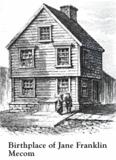

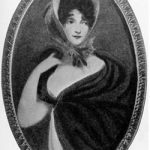
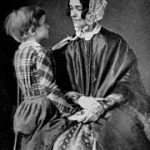
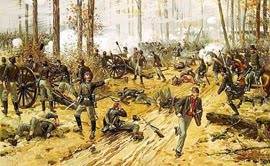
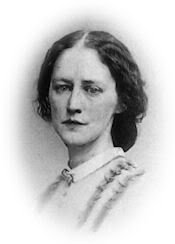
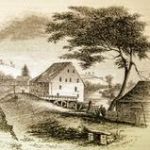
One thing I find interesting is that Jane married at 15 when the legal age was 16. Her parents didn’t approve of her husband leading me to think that she was a bit rebellious or pregnant. the rest of her brothers and sisters married at a later age. She married a bum. So her life was hard and most people would feel sorry for her but didn’t she choose that path? Had she waited and married a more appropriate man, would her life had been better? I think so. I’m sorry, I don’t buy into the fact that she was poor because she was a woman or uneducated though she could read and write which was better than most women. No, she was poor because she choose poorly and then had a bunch of kids to boot. Ladies, it does matter who you sleep with and marry. Don’t marry just for love but use your head and choose wisely a man who is healthy and responsible, otherwise your life will suffer. And having a lot of children is also expensive and can put you in the poor house. With less than $30/month at walgreens or walmart (without insurance), you can get reliable birth control. Have a friend drive you to a lost cost or free clinic for the prescription. Make informed, right choices, get educated, ask for God’s help, and you can go far in life without being broke all the time.